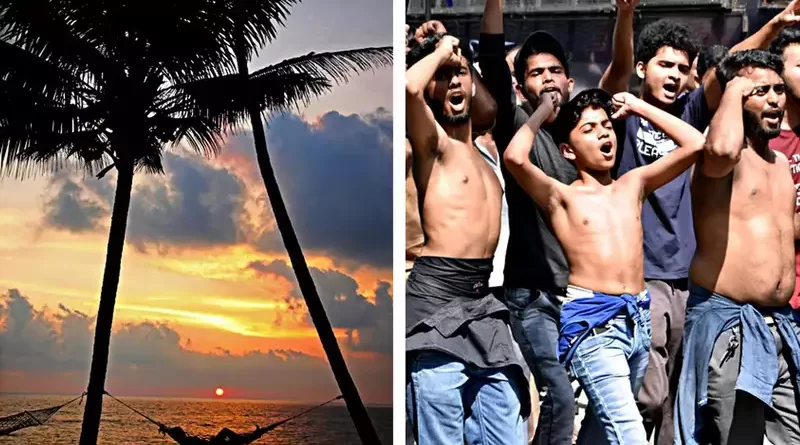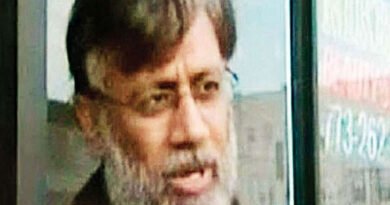Angry gods’ own country
That an explosion at a Jehovah’s Witnesses meet raised Kerala’s political discourse to fever-pitch shows how multiple forms of radicalisation are roiling the multi-religious state
What would happen to God’s own country, if, instead of smiling down on a thin strip of green tropical glory, sandwiched between spice-bearing mountain slopes to the east and manycoloured sand and surf to the west, the god in question splits into several, each of whom waxes wrathful, sending their followers on earth onto the warpath?
Kerala today has to confront this question, followinga bomb blast at a gathering of a minuscule religious group that killed three, injured scores, and more significantly, raised the temperature of the political discourse to feverpitch, with potentially explosive consequences in the multi-religious state.
That danger was averted, thanks to the swift identification of the culprit as a member of the targeted religious group, as he confessed to his crime in a Facebook Live, before surrendering himself at a police station. But before his confession social media had already filled with speculation, of the bomb blasts having been committed by radical Islamic groups.
Kerala’s religious composition is unique among Indian states. About 57% of the population is Hindu, 23% are Muslim and 19% are Christian. Kerala has had trading links with the Levant from ancient times, and hosted a Jewish community of Levantine traders in Kochi, when a breakaway faction of Jews in their homeland accepted Jesus Christ as the promised Messiah and Christ’s apostles spread out to mobilise supporters.
It is believed that St Thomas, one of the apostles, reached Kerala and Sri Lanka, and converted a section of the Jews and some local residents to the new faith. Even today, several denominations of Kerala Christians carry on with liturgy in Syriac, a form of Aramaic, the language supposedly spoken by Christ. Apart from Syrian Christians, descendants of the original converts, subsequent streams of conversion by European missionaries have created multiple strands of Christianity in Kerala.
Islam, too, came to Kerala, through trading contacts, in the very same century in which it was founded in Arab lands. One Kerala king is supposed to have converted to Islam. Christians and Muslims coexisted with Hindus without much friction for centuries, these two groups occupying the position of banias – there is no explicit bania group among Kerala’s Hindus.
Given the polytheistic nature of Hinduism, it was not difficult for India’s dominant religion to absorb Kerala’s little traditions, with strong Buddhist and more ancient influences, into its ambit. Christianity and Islam joined the lot.
The Jehovah’s Witnesses emerged from a Bible study group founded in the US in the 1870s. Their reading of the Bible led them to abandon the notion of the Holy Trinity, of the Father, the Son and the Holy Ghost. They believe the world lives in sin, and redemption is possible only for their followers. They recognise no state, and refuse to serve in the army or sing any national anthem. In Kerala, a school expelled some young students for refusing to sing the national anthem, and the resulting legal challenge ended up in the Supreme Court. Justice O Chinnappa Reddy annulled the expulsions, pronouncing that “(o)ur tradition teaches tolerance; our philosophy preaches tolerance; our Constitution practises tolerance. Let us not dilute it.” Students can stand up in respect, he ruled, without joining the singing. In Kerala, their congregation numbers about 25,000.
At the turn of the 20th century, strong anti-caste movements swept through Travancore and Cochin, princely states in southern and central Kerala, distinct from Malabar, administered by the British from Madras. Ritually inferior caste groups identified education as the path to emancipation, and went about setting up schools. Christian missionaries set up their own schools. In order not to lose legitimacy, the government also set up schools.
To protest against upper-caste refusal to admit a girl from an agricultural labour caste, Pulaya, into the classroom, Pulaya leader Ayyankali organised a strike. Farm workers bucked tradition, hunger, want, uppercaste threats and violence, and continued their boycott of work for two seasons. Ayyankali withstood assassination attempts, organised support for workers. Finally, the upper-caste landlords gave in, and decided to open schools to children of all castes.
Sree Narayana Guru de-legitimised caste within Hindu spirituality, arguing that Advaita, the philosophy of non-duality, leaves no room for distinctions based on caste or religion. His teachings had enormous influence.
This dynamic of social change was carried forward by the communists, who organised all sections of the working people to secure their rights, which included effective land reforms. The communists realised the Constitution’s promise of democracy, and reshaped all the state’s political parties into their own image.
However, the communists balked at fostering capitalism, the economic counterpart to liberal democracy, leading to economic stagnation and, over time, atrophy of cultural dynamism and the communists’ own political authority. Large-scale emigration and the resultant remittance income have cushioned the fallout.
It is in this context that Islamist radicalisation made inroads into Kerala, despite the active presence of the Muslim League, a party that has championed Muslim interests in harmony with other religious groups. Political opportunism has tempted the communists to use radical elements to weaken the League.
The Hindu right woos Kerala’s Christians, even as its fringe groups attack churches in north India. Islamists draw globalised inspiration, and wield clout, even if numerically small.
The bomb blast at the Jehovah’s Witnesses meet showed the capacity for explosive violence even in small groups in Kerala. The feverish suspicion on social media that the attack could have been carried out by radical Islamic or Hindu groups reveals the potential for violence among all major social groups.
Kerala cries out for another paradigm shift in politics and economics, if this mix of diverse radicalisations is not to blow up in its face. The rare solidarity that came to the surface in the wake of the 2018 floods shows there is hope. Concerted action must build on that hope.
Author: TK Arun
Source: Times of India




